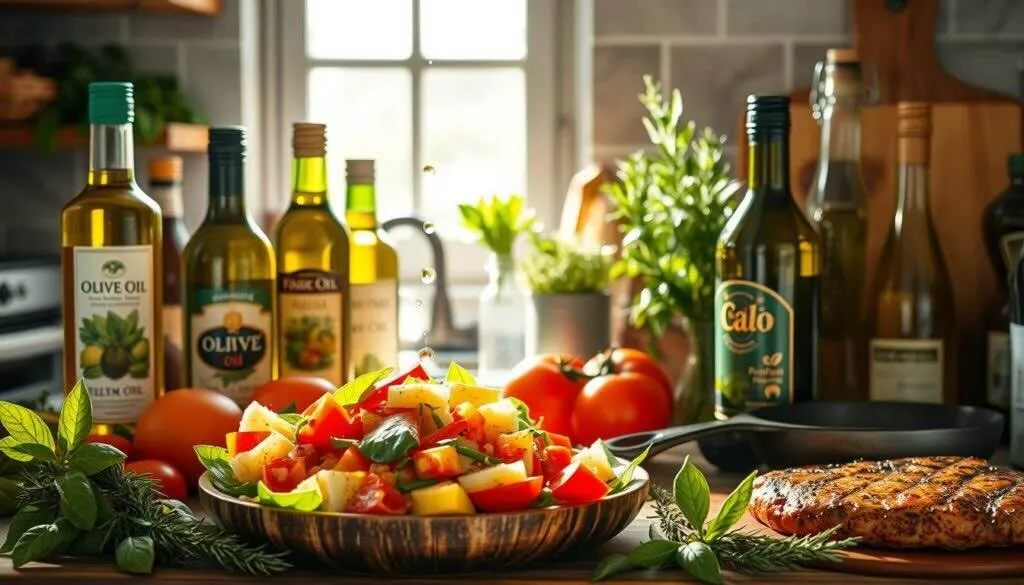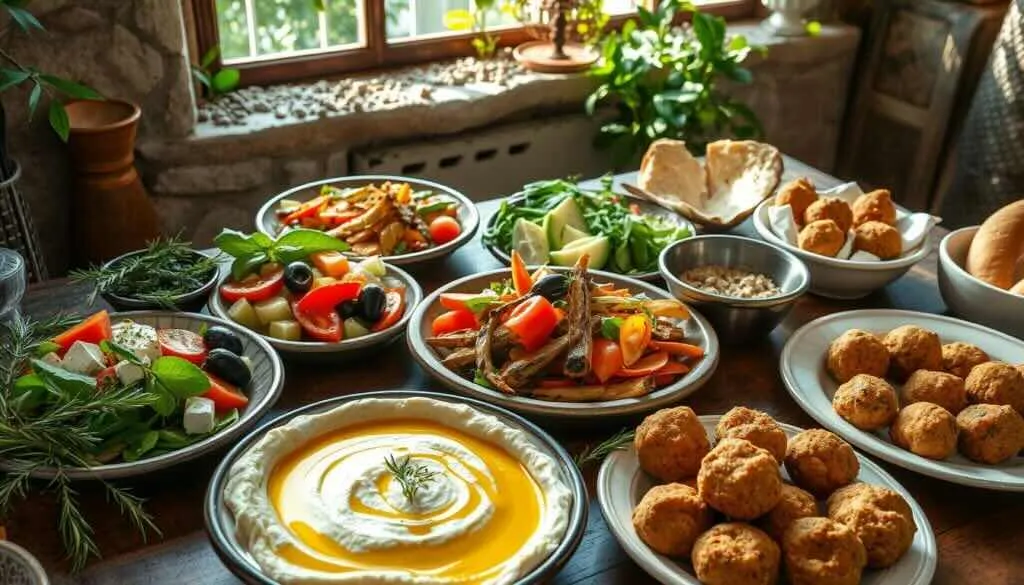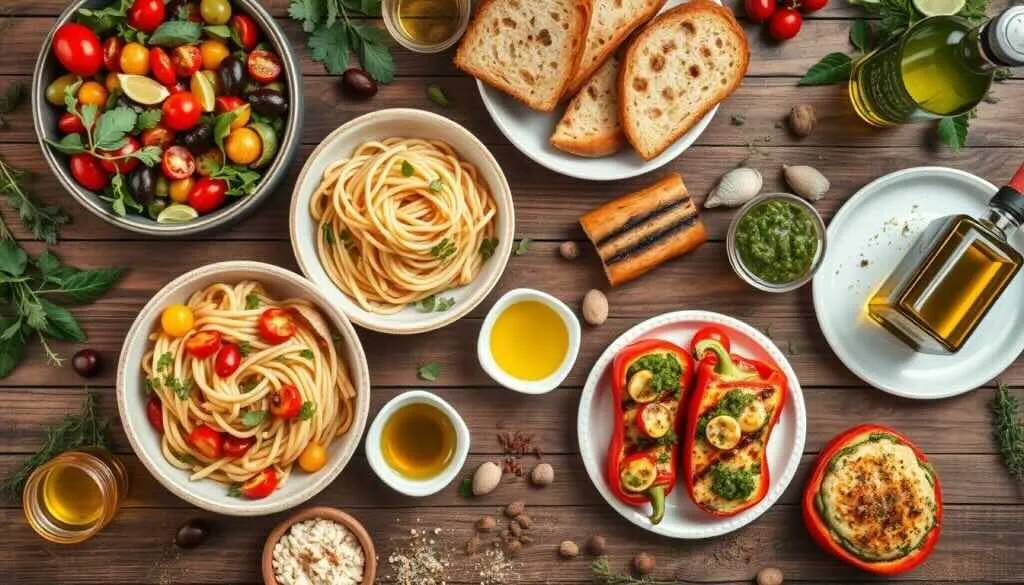Ever thought one ingredient could change your cooking? Olive oil recipes can do just that. They turn simple meals into amazing dishes. Mediterranean cooking has known this for ages, and now you can too.
Imagine making dishes that are full of flavor and health. With olive oil recipes, you can go from basic to brilliant. Our seven olive oil recipes will take you on a tasty adventure of creativity and taste.
Table of Contents
Key Takeaways
- Olive oil is versatile and can transform multiple types of dishes
- Mediterranean cooking relies heavily on high-quality olive oil
- Olive oil offers significant health benefits beyond cooking
- Experimenting with olive oil recipes can enhance your culinary skills
- Understanding different olive oil types improves cooking results
Understanding the Magic of Cooking with Olive Oil
Olive oil recipes are more than just a trend—they’re a way to make meals special. Olive oil adds rich flavor and health benefits to your dishes. Whether you’re roasting, baking, or dressing salads, olive oil recipes bring out the best in your ingredients.

Cooking with olive oil is about more than flavor. It’s a healthier way to cook. The right olive oil can add taste and nutrition to your dishes.
Types of Olive Oil for Different Cooking Methods
Not all olive oils are the same. Here’s a guide on olive oil types and their uses:
- Extra Virgin Olive Oil (EVOO): Best for low-heat cooking, dressings, and finishing dishes
- Virgin Olive Oil: Suitable for medium-heat cooking
- Light Olive Oil: Ideal for high-heat cooking and baking
Health Benefits of Cooking with Olive Oil
“Olive oil is liquid gold for your health and your meals.” – Mediterranean Cooking Experts
| Health Benefit | Impact |
|---|---|
| Heart Health | Reduces heart disease risk by 30% |
| Inflammation Reduction | Decreases inflammation markers by 20% |
| Nutrient Absorption | Increases nutrient intake by 25% |
Essential Kitchen Tools for Olive Oil Cooking
To get the most out of olive oil cooking, get these tools:
- High-quality olive oil dispenser
- Dark glass storage bottles
- Infusion bottles for herb-flavored oils
- Thermometer for monitoring cooking temperatures
Mastering olive oil recipes means knowing its properties and choosing the right type. With practice, your meals will go from ordinary to extraordinary.
Olive Oil Recipes for Mediterranean-Inspired Dishes

Explore the world of Mediterranean cuisine with olive oil recipes. These dishes turn simple meals into unforgettable experiences. They celebrate the rich, vibrant flavors that make Mediterranean cooking so beloved worldwide.
Mediterranean dishes often start with olive oil. Extra Virgin Olive Oil (EVOO) is the top choice. It adds amazing taste and health benefits to any recipe.
“Olive oil is not just an ingredient, it’s the heart of Mediterranean cooking”
- Greek Salad: A classic dish featuring crisp vegetables dressed in premium olive oil
- Spanish Gazpacho: A refreshing cold soup highlighting olive oil’s versatility
- Italian Bruschetta: Toasted bread enhanced with rich olive oil and fresh herbs
Discover these flavor-packed Mediterranean dishes. They show how versatile olive oil can be:
| Dish | Preparation Time | Key Ingredients |
|---|---|---|
| Greek-Inspired Bread Dipping Oil | 10 minutes | EVOO, herbs, garlic |
| Marinated Olives and Feta | 10 minutes | Kalamata olives, feta, olive oil |
| Slow-Cooked Collard Greens | 1 hour | Collard greens, olive oil, spices |
Each recipe offers a unique way to use olive oil. It turns simple ingredients into Mediterranean-inspired masterpieces. These dishes will take your taste buds on a journey to Southern Europe’s sunny coastlines.
Mastering Herb-Infused Olive Oil Sauces
Discover how to make your dishes stand out with herb-infused olive oil. Your kitchen can turn into a place where simple ingredients become amazing meals. This happens through clever herb mixes and the right way to infuse.
Herb-infused olive oil can elevate any dish. These olive oil recipes are simple yet transformative. Mix basil, garlic, or rosemary with olive oil for a burst of flavor. Use these sauces in pasta, grilled meats, or even as a dip for bread.
Classic Mediterranean Herb Combinations
Mediterranean cooking has amazing herb mixes for olive oil. Here are some top picks:
- Basil and garlic for a strong Italian flavor
- Rosemary and thyme for a rich Provençal taste
- Oregano and red pepper flakes for a spicy Greek flavor
Storage and Preservation Tips
Keeping your herb-infused olive oil fresh and safe is key. Here’s how:
- Use containers that keep air out to stop flavor loss
- Keep it in a cool, dark spot
- Use it within 1-2 weeks for the best taste
| Herb Combination | Infusion Temperature | Recommended Infusion Time |
|---|---|---|
| Basil & Garlic | 165°F | 2-3 hours |
| Rosemary & Thyme | 165°F | 3-4 hours |
| Oregano & Red Pepper | 165°F | 1-2 hours |
Pairing Suggestions
Herb-infused olive oil can make many dishes better. Try these ideas:
- Meyer Lemon Olive Oil with grilled seafood
- Garlic Olive Oil on pasta
- Rosemary Olive Oil on roasted veggies
“Start with small amounts of infused oil to control flavor intensity and discover your perfect balance.” – Culinary Expert
Try these tips to make your own top-notch herb-infused olive oil. It will wow your family and friends.
Transforming Vegetables with Olive Oil Roasting
Discover the secret to amazing olive oil recipes with vegetable roasting. Roasting turns simple veggies into caramelized, flavorful treats. It’s a game-changer for your cooking.
Roasting vegetables with olive oil is a game-changer. These olive oil recipes turn simple veggies into caramelized, flavorful treats. Try roasting carrots, zucchini, or bell peppers with olive oil for a healthy and delicious side dish.
“Roasting vegetables is like giving them a golden, crispy makeover that makes everyone at the table excited to eat their greens!” – Culinary Expert
Essential Roasting Tips
- Choose vegetables with similar cooking times for even roasting
- Cut vegetables into uniform sizes to ensure consistent cooking
- Use extra virgin olive oil for maximum flavor and health benefits
- Roast at temperatures between 375-425 degrees Fahrenheit
Roasted veggies are a nutritional powerhouse. Roasting at 375 degrees or higher boosts antioxidants. This can help your gut health and reduce inflammation.
Nutrient-Boosting Roasting Techniques
- Use ½ cup of olive oil for every 3-4 cups of mixed vegetables
- Initial roasting time: 15-20 minutes
- Additional roasting: 20-60 minutes depending on vegetable size
- Store leftover roasted vegetables in an airtight container for up to 7 days
The secret of roasted veggies is in breaking down cell walls. This makes them easier to digest and absorb nutrients. Pro tip: Adding a ¼ cup of water can create a steamed quality if you prefer softer vegetables.
Once you learn to roast veggies, your olive oil recipes will change forever. Experiment, have fun, and watch your meals become culinary masterpieces!
Olive Oil in Baking: Sweet and Savory Creations
Baking with olive oil is a healthier alternative to butter. These olive oil recipes include cakes, cookies, and bread. Olive oil adds moisture and a subtle richness to your baked goods. Experiment with these recipes for a tasty twist.
Starting to bake with olive oil is a fun journey. It’s all about finding the right balance between health and flavor. The trick is knowing how to swap olive oil for butter in your recipes.
Converting Butter Recipes to Olive Oil
Changing your recipes to use olive oil is simpler than you think. Here are some tips to get you started:
- Replace butter with 3/4 cup of olive oil for every 1 cup of butter
- Use extra-virgin olive oil for more robust flavor in savory bakes
- Select lighter olive oils for delicate sweet recipes
Temperature and Mixing Guidelines
For great results with olive oil baking, pay attention to temperature and mixing:
- Bake most olive oil-based recipes at 350°F
- Mix olive oil thoroughly with dry ingredients
- Avoid overmixing to prevent tough baked goods
Flavor Enhancement Techniques
To make your olive oil recipes even better, try these flavor tips:
- Add citrus zest for brightness
- Incorporate herbs like rosemary or thyme
- Use high-quality extra-virgin olive oil for maximum flavor
“Olive oil isn’t just a healthy alternative – it’s a flavor enhancer that can take your baking to the next level.” – Culinary Expert
With these tips, you’ll make olive oil baked goods that are both healthy and delicious.
Fresh and Vibrant Olive Oil-Based Salad Dressings
Make your salads shine with homemade olive oil recipes. These recipes turn simple greens into amazing dishes. Extra virgin olive oil is the key to making tasty, healthy dressings that are full of flavor.
When you make your own salad dressings, you choose what goes in. This means you get to pick the best ingredients and make them healthier. Here are some benefits of making olive oil-based dressings:
- Full control over ingredient quality
- No preservatives or artificial additives
- Customizable flavor profiles
- More cost-effective than store-bought options
“A great salad dressing is like a perfect symphony – every ingredient plays a crucial role.” – Culinary Expert
Classic Mediterranean Vinaigrette Recipe
This simple yet elegant olive oil recipe is quick to make:
- 4 tablespoons extra virgin olive oil
- Juice of ½ lemon
- 1 teaspoon flaky sea salt
- Fresh ground black pepper
| Ingredient | Quantity | Nutritional Value |
|---|---|---|
| Extra Virgin Olive Oil | 4 tablespoons | Rich in antioxidants, vitamins E and K |
| Lemon Juice | ½ lemon | High in Vitamin C, aids digestion |
| Sea Salt | 1 teaspoon | Mineral content, enhances flavor |
For the best salad dressings, whisk ingredients well and taste before serving. Your homemade olive oil dressings will be healthier and tastier than any store-bought version.
Seafood and Olive Oil: Perfect Pairings
Exploring seafood and olive oil reveals a world of tasty recipes. These dishes turn simple meals into something special. The Mediterranean has long known the magic of this mix, bringing out seafood’s best flavors.
Olive oil is a key ingredient that boosts seafood’s taste and health benefits. When cooking seafood, focus on marination and cooking temperature.
Marination Techniques for Seafood
Marinating seafood in olive oil makes it taste amazing. Here are some tips:
- Use extra virgin olive oil for the best flavor
- Mix olive oil with fresh herbs like parsley, thyme, and basil
- Add citrus zest to brighten the marinade
- Marinate for 15-30 minutes to keep the texture right
Optimal Cooking Temperature Guidelines
Cooking seafood needs precision to keep its taste and texture. Here’s a quick guide for different types:
| Seafood Type | Recommended Temperature | Cooking Method |
|---|---|---|
| White Fish | 325-350°F | Baking or Poaching |
| Shrimp | 375°F | Grilling or Sautéing |
| Salmon | 400°F | Roasting |
“The secret to perfect seafood is gentle cooking and high-quality olive oil.” – Mediterranean Chef
By learning these olive oil recipes and techniques, you’ll make seafood dishes that taste great and are good for you. The trick is to let the seafood’s natural flavors shine through with a light touch.
Creating Olive Oil-Based Marinades and Rubs
Start transforming your meals with olive oil recipes for marinades and rubs. These techniques can make simple ingredients into amazing dishes.
Olive oil is great for marinades, keeping food moist and flavorful. When making marinades, keep these tips in mind:
- Use high-quality extra virgin olive oil as your primary liquid base
- Balance acid components like lemon juice or vinegar
- Incorporate fresh herbs and spices for depth of flavor
- Understand optimal marination times for different proteins
Try this simple olive oil marinade recipe:
“A great marinade transforms ordinary ingredients into extraordinary meals.”
Quick Lemon Herb Marinade:
- 2 tbsp olive oil
- 2 tbsp fresh lemon juice
- 3 tbsp chopped fresh basil
- 2 minced garlic cloves
- Salt and pepper to taste
Here are some tips for making perfect marinades and rubs:
- Marinate chicken for 4-6 hours in the refrigerator
- Use oil-based binders to help spices adhere to proteins
- Experiment with spice combinations like paprika, cumin, and black pepper
Different proteins need different marinating times. Chicken works well with shorter times, while beef can marinate for up to 24 hours. Seafood should be marinated briefly to avoid losing texture.
Appetizers and Small Plates with Olive Oil
Make your parties better with olive oil recipes. They turn simple appetizers into tasty Mediterranean dishes. These small plates show how extra virgin olive oil adds flavor to every bite.
Olive oil makes simple ingredients into amazing appetizers. From classic Mediterranean dishes to new small plates, these recipes show the power of good olive oil.
- Roasted Pepper Caprese Salad
- White Bean Bruschetta
- Olive Crostini
- Mediterranean Mezze Platter
“Small plates are a celebration of flavor, and olive oil is the secret ingredient that brings them to life.”
Turn your appetizer spread into a gourmet feast with these olive oil recipes. Here are some tasty and healthy options that everyone will love.
| Appetizer | Olive Oil Usage | Preparation Time |
|---|---|---|
| Roasted Pepper Caprese | 2 tablespoons | 20 minutes |
| Mediterranean Mezze | 2 tablespoons | 30 minutes |
| Olive Crostini | 1 tablespoon | 15 minutes |
The secret to great appetizers is high-quality extra virgin olive oil. These recipes show how a little olive oil can make simple ingredients into fancy small plates. Your guests will want more.
- Choose fresh, high-quality ingredients
- Use extra virgin olive oil generously
- Experiment with herb combinations
- Focus on presentation and flavor
Whether it’s a casual get-together or a fancy party, these olive oil appetizers will impress everyone. They’ll make your cooking skills shine.
Tips for Selecting and Storing Quality Olive Oil
When you’re cooking with olive oil, picking the right one is key. Knowing how to choose and store it can make a big difference in your dishes.
Professional chefs say not all olive oils are the same. Here’s what to look for when picking olive oil:
- Check the harvest date – fresher is always better
- Look for dark or opaque bottles to protect from light exposure
- Seek extra-virgin olive oil (EVOO) for maximum flavor and health benefits
- Prefer oils with recent harvest dates within the past 12-18 months
Storage is just as important as selection. Olive oil’s enemies are heat, light, and oxygen. To keep your oil fresh:
- Store in a cool, dark place away from direct sunlight
- Keep containers tightly sealed
- Avoid storing near heat sources like stoves
- Use smaller quantities to ensure freshness
“A great olive oil can transform ordinary ingredients into extraordinary dishes.” – Professional Chef Recommendation
When checking olive oil quality, use your senses. Good extra-virgin olive oil smells fresh and grassy. It might taste slightly bitter, which is a sign of its health benefits.
Choosing and storing olive oil right makes your recipes taste amazing. It keeps the flavor and health benefits of the oil.
Conclusion
Exploring olive oil recipes opens up a world of flavors and cooking techniques that go beyond the ordinary. Olive oil has the power to transform simple meals into extraordinary culinary experiences. Its health benefits, combined with its rich and versatile taste, make it a cornerstone of modern cooking.
Studies highlight olive oil’s remarkable qualities—it remains stable at high heat, enhances flavors in countless ways, and serves as a healthier alternative to other fats. By incorporating olive oil recipes into your routine, you not only elevate the taste of your dishes but also boost their nutritional value.
As you continue experimenting with olive oil recipes, each dish becomes an opportunity to refine your cooking skills and expand your culinary horizons. Start with simple recipes, explore the nuances of different olive oil varieties, and gradually build your confidence in the kitchen. Your journey with olive oil recipes is about more than just food—it’s about embracing healthier, tastier meals and connecting with the rich traditions of Mediterranean cuisine.
Take the first step toward transforming your cooking today. Stock your pantry with high-quality extra virgin olive oil, pair it with fresh ingredients, and let your creativity shine. Whether you’re drizzling it over salads, using it to sauté vegetables, or baking with it, olive oil recipes will delight your taste buds and nourish your body. Start your olive oil adventure now and discover the endless possibilities it brings to your kitchen!
Frequently Asked Questions (FAQs)
What can I do with olive oil?
Olive oil is super versatile! You can use it in olive oil recipes like salads, pasta, and roasted veggies. First, drizzle it on bread for a tasty snack. Next, use it to sauté or fry foods. Also, it’s great for baking cakes or cookies. You’re going to love how it makes everything taste better!
What is the healthiest way to eat olive oil?
The healthiest way is to use it raw in olive oil recipes. First, try it in salad dressings or dips. Next, drizzle it over cooked dishes like soups or grilled fish. Also, avoid overheating it to keep its nutrients. It’s like giving your body a little health boost with every meal!
What does drinking olive oil first thing in the morning do?
Drinking olive oil in the morning can help your digestion. First, it wakes up your stomach gently. Next, it gives you healthy fats to start your day. Also, it might boost your energy. Think of it as a mini health hack, but always check with a doctor first!
What is best to cook with olive oil?
Olive oil works best in olive oil recipes that need medium heat. First, use it for sautéing veggies or frying eggs. Next, try it in marinades for meats or fish. Also, it’s perfect for baking bread or muffins. It’s like a kitchen superhero for so many dishes!
Can I use olive oil for desserts?
Yes, you can! Olive oil adds a rich flavor to desserts. First, try it in cakes or brownies. Next, drizzle it over ice cream for a fancy touch. Also, it’s great in cookie recipes. You’ll be amazed how olive oil recipes can make sweets even more delicious!

